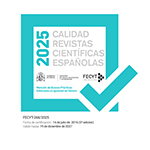“Mutilated gentlemen” and “dishonoured” women: Body, gender and privilege in the Spanish postwar
Abstract
This article analyses the bodily experiences of Spanish men and women in order to broaden our understanding of the Spanish postwar. Drawing on the examples of war disability and rape, this research outlines the limits of the privilege which came along with being associated with the winning side in the Civil War, and questions the extent to which this affiliation functioned as a guarantor against the challenges of life under early Francoism. Within the context of generalised postwar hardship, important hierarchies and relative privileges emerged between men and women, and individuals from different social backgrounds. Men, for example, benefitted to a greater extent from «victor privilege» than their female counterparts. Meanwhile, there were also significant hierarchies between men from different classes with different kinds of disabilities. For ordinary Spaniards, the postwar period can be considered a continuation of the war, though not one between combatants, but rather a struggle against unemployment and hunger, a growing colonisation of women´s bodies, and the meagre or inexistent social benefits provided by the dictatorship.
Downloads
Article download
License
Aquellos autores/as que tengan publicaciones con esta revista, aceptan los términos siguientes:
a. Los autores/as conservarán sus derechos de autor y garantizarán a la revista el derecho de primera publicación de su obra, el cuál estará simultáneamente sujeto a la Licencia de reconocimiento de Creative Commons Reconocimiento-No comercial-Sin obra derivada 4.0 España que permite a terceros compartir la obra siempre que se indique su autor y su primera publicación esta revista.
b. Los autores/as podrán adoptar otros acuerdos de licencia no exclusiva de distribución de la versión de la obra publicada (p. ej.: depositarla en un archivo telemático institucional o publicarla en un volumen monográfico) siempre que se indique la publicación inicial en esta revista.
Plagio y fraude científico
La publicación de un trabajo que atente contra los derechos de propiedad intelectual será responsabilidad de los autores/as, que serán los que asuman los conflictos que pudieran tener lugar por razones de derechos de autor. Los conflictos más importantes pueden darse por la comisión de plagios y fraudes científicos.
Se entiende por plagio:
1.Presentar el trabajo ajeno como propio.
2.Adoptar palabras o ideas de otros autores sin el debido reconocimiento.
3.No emplear las comillas u otro formato distintivo en una cita literal.
4.Dar información incorrecta sobre la verdadera fuente de una cita.
5.El parafraseo de una fuente sin mencionar la fuente.
6.El parafraseo abusivo, incluso si se menciona la fuente.
Las prácticas constitutivas de fraude científico son las siguientes:
1.Fabricación, falsificación u omisión de datos y plagio.
2.Publicación duplicada.
3.Conflictos de autoría.












